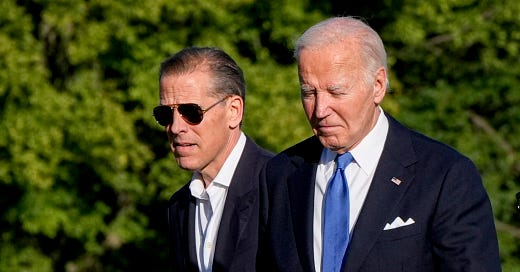Biden’s pardon undermines the integrity he promised to restore
A father’s love is commendable, but the presidency demands impartial justice. This pardon is a grave mistake.
As Trump plots to weaponize the DOJ, Biden’s pardon of Hunter undermines trust in impartial justice. It’s a huge mistake.
The presidential pardon is a constitutional prerogative, but it is not without moral and institutional consequences. The framers of the Constitution understood the need for such an instrument to temper justice with mercy. Yet, they also presumed the officeholder wielding this power would do so with an acute awareness of its weighty implications—not only for justice but for the integrity of the republic.
Public trust in institutions is already alarmingly low. Biden’s pardon takes it lower. A president’s first duty is to the institution of the presidency and the preservation of public trust, not familial redemption.
Moments like this are a reminder of how important it is to hold all our leaders accountable—no exceptions, no excuses.
To state it plainly, President Biden’s use of the pardon in this instance diminishes the office and the principle of equal justice under the law. The president’s actions, however well-intentioned, sets a troubling precedent. If one president can pardon a relative under the guise of mercy or perceived prosecutorial overreach, what stops others from doing so for less noble reasons? The pardon power, unconstrained by formal checks, depends entirely on the wisdom and restraint of the individual president. History teaches us that power, unmoored from prudence, invites misuse.
I was proud to support Joe Biden in 2020 and to work to get him elected. But I can’t lie—I’m deeply disappointed in President Biden’s decision to pardon his son. It’s a Trumpian act. This isn’t about politics or partisanship for me; it’s about the rule of law. One of the biggest reasons I backed Biden was because I believed he would restore trust in our institutions, especially after the years of chaos and norm-breaking under Trump. Pardoning Hunter undercuts that message in a way that’s impossible to ignore.
The pardon power should be exercised sparingly, with an eye not just to the immediate human impact but also to the enduring principles of good governance.
I understand that this must have been an incredibly personal decision for the president. But when you’re in public office—especially the presidency—you don’t get to make decisions that only serve your family. Your first obligation is to the country and to upholding the principles you were elected to defend. To me, this feels like a step backward.
I know some will defend Biden’s decision, but it’s hard to reconcile with the promise he made to restore integrity to the office. I’ll always be proud of working to elect leaders who stand against Trumpism, but moments like this are a reminder of how important it is to hold all our leaders accountable—no exceptions, no excuses.
The rule of law is not merely a principle but the foundation of our republic. To preserve the dignity of the office and the trust of the people, restraint, not pardon, would have been the wiser choice.






Bullshit! I’d be disappointed if a father in that position wouldn’t pardon him. I say good for him, he did the right thing.
With the highest respect, America has made its preferences loud and clear in this last election. The sector of America that will respect Biden for taking the high ground and “returning respectability to office” proved to be illusory. Biden refraining from the pardon would accomplish absolutely nothing of consequence. In light of that, he’d be in dereliction not to